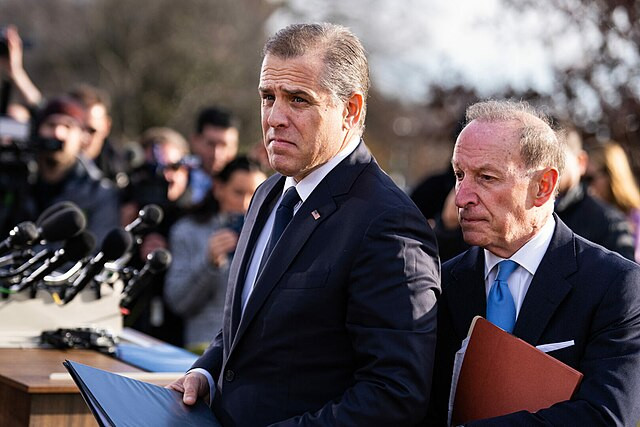A jury was seated on Monday for the federal gun case against Hunter Biden, marking a significant step in the high-profile trial of President Joe Biden's son. Prospective jurors were questioned on their views regarding gun rights and drug addiction, while First Lady Jill Biden watched from the front row of the courtroom in a show of support.
The jury, consisting of 12 panelists and four alternates, was selected in just one day. Opening statements are scheduled to begin on Tuesday. Hunter Biden faces three felony charges related to a 2018 firearm purchase, which occurred during a period when he has publicly admitted to struggling with a crack cocaine addiction. He is accused of lying on a federal gun purchase form, claiming he was not a drug user, and illegally possessing the firearm for 11 days.
The jury selection process involved more than 65 prospective jurors, with 29 dismissed by late afternoon. One dismissed juror expressed an inability to be impartial due to preconceived negative opinions about Hunter Biden formed from media reports. "It's not a good one," she replied when asked about her opinion.
The trial proceeds following the collapse of a plea deal that would have averted a trial amid the 2024 election cycle. Hunter Biden has pleaded not guilty, asserting that he is being unfairly targeted by the Justice Department. This assertion comes after Republicans criticized the now-defunct plea deal as preferential treatment for the president's son.
The proceedings in Delaware are unfolding concurrently with former President Donald Trump's legal troubles. Trump, the presumptive 2024 Republican presidential nominee, was recently convicted of 34 felonies in New York City related to a hush money scheme. Although unrelated, the proximity of these cases underscores the increasing involvement of the criminal courts in the 2024 campaign.
In Delaware, prospective jurors who answered "yes" to any questions on a preliminary questionnaire were individually interviewed by Judge Maryellen Noreika to assess their ability to remain fair and impartial. The jurors' names were not disclosed. Questions focused on their knowledge of the case, views on gun ownership, and personal or familial experiences with substance abuse. Political biases were also scrutinized.
One potential juror was dismissed due to his familiarity with gun sales forms, while another was excused because of a personal connection to Beau Biden, the late son of Joe Biden. Other dismissals included individuals with law enforcement backgrounds or strong political opinions.
Throughout the selection process, Hunter Biden remained attentive, taking notes periodically. His family, including his wife Melissa Cohen Biden, half-sister Ashley Biden, and a family friend, Ricky Smith, were present in the courtroom. Smith, expressing frustration over the case, said, "It ain't right for him to be sitting there because he was a drug addict."
The charges against Hunter Biden stem from a period of heavy drug use following the death of his brother Beau Biden in 2015. During the 11 days in October 2018 that he possessed the gun, he had indicated on the purchase form that he was not a drug user. Defense attorneys suggest they may argue that Hunter Biden did not see himself as an addict at the time.
First Lady Jill Biden, who celebrated her 73rd birthday on Monday, shared a moment of support with her son during a break, embracing and kissing him on the cheek. President Joe Biden issued a statement of support, saying, "Jill and I love our son, and we are so proud of the man he is today."
The case continues amidst concerns about its potential impact on President Biden, who is contending with low poll numbers and preparing for the upcoming presidential debate. Allies worry that the trial could become a distraction during the campaign.
Judge Noreika, appointed by Trump, previously questioned the plea deal's unusual aspects, leading to its collapse. The plea agreement would have involved a guilty plea to misdemeanor tax offenses and a diversion agreement on the gun charge. After the deal fell apart, Attorney General Merrick Garland appointed the top investigator as a special counsel, resulting in Hunter Biden's indictment in September.
Hunter Biden faces up to 25 years in prison if convicted, although first-time offenders typically do not receive the maximum sentence. The trial will likely spotlight some of Hunter Biden's most challenging personal struggles, as well as his interactions with the criminal justice system.
Additionally, Hunter Biden faces separate charges in California related to failing to pay $1.4 million in taxes. Both cases were initially part of the collapsed plea deal. The upcoming trial in Delaware will likely add further scrutiny to his public and private life, reflecting broader political and legal tensions in the U.S.






